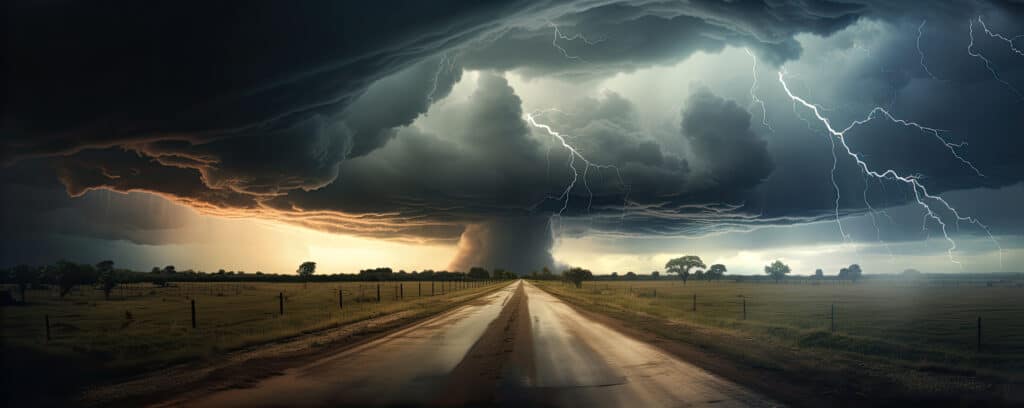A meteorologist is more than a person who works on television and stands in front of a weather screen. There are a number of educational requirements necessary to join this field. In high school, it is wise to take various science classes, including biology, physics, and chemistry. As you enter the collegiate level, it is important to uncover the smartest degree options. There are many employment possibilities, so you will want to know what study choices are most valuable.
Educational Requirements for a Meteorologist
In most cases, a candidate will attend a four-year university and pursue a bachelor’s degree in atmospheric science or a related discipline. Classes in computer science will be helpful as well. To be sure, a meteorologist will need to research weather patterns and use various programs to analyze data.
Concentrating in atmospheric science allows you to learn various aspects of wind, clouds, and air. Overall, you will receive great knowledge about nature at all levels. As a meteorologist, you will likely concentrate on the sky. In particular, you will study the configuration of liquids and gases in the atmosphere so that you can predict what happens as they interact. This will help to deliver a forecast that maps accurate temperatures and precipitation. Data will be used to predict dangerous weather patterns and other climate changes as well.
Skills Necessary to Become a Meteorologist
- Curiosity. A successful meteorologist has an inquisitive nature. Asking questions helps to understand reasons behind patterns.
- Adaptability. Weather is unplanned. Hazardous conditions can occur at any time. A meteorologist may work long and strange hours and in different environments, especially when emergencies strike.
- Pay Attention to Detail. Since meteorologists face large amounts of complex data, it is essential to be able to observe and synthesize information quickly and accurately.
Possible Careers and Study Options
Since there are a number of jobs that a meteorologist can obtain, it is helpful to examine potential fields of study that complement this type of degree. Most people think that a meteorologist must work in the public eye, including television news. In this case, it is wise to enroll in classes that focus on communications. Public speaking and broadcasting will teach you how to effectively and intelligently speak to an audience and present a forecast. Besides media employment, there are other possibilities. For instance, you may perform research in an academic setting. This is a good choice for an individual who is interested in climate change or atmospheric physics. If your goal is to work for the government or a military branch, you may want to hone your computer skills so that you learn the best ways to collect and analyze data from a number of platforms.
The National Weather Service employs more meteorologists than any other outlet. The organization’s main purposes are protecting the community and saving lives. Field offices are scattered across the country so that accurate forecasts can be broadcast, especially in times of hazardous conditions. Researchers uncover ways to improve radar and data collection techniques.
Non-Traditional Jobs in Meteorology
As previously discussed, most people are familiar with their local weather presenters on television. However, there are a multitude of non-traditional jobs that have the same degree requirements.
- Insurance Companies. Meteorologists in this industry are involved with risk management and mitigation duties.
- Consulting Firms. Oftentimes, engineers work with meteorologists to help contractors build safe and efficient structures.
- Forensics. A forensic meteorologist investigates weather conditions that may have led to traffic accidents or natural disasters. In certain cases, this individual may be called to testify in a court of law.
Gaining Practical Experience
While obtaining a degree, it makes sense to gain practical experience in the field of meteorology. Many research institutes and related organizations offer internships to qualified candidates. This means that you can work next to individuals who teach skills that enhance your classroom learning. Also, it is possible to gain part-time employment with a private company so that you obtain useful knowledge in real-world settings. For example, certain cruise lines and airports hire individuals to map weather patterns so that safe navigation is possible.
Pursue a Professional Certification
Alongside a degree, it may be quite useful to obtain a professional certification in meteorology. This proves that you are dedicated to the field and want to focus your expertise. The American Meteorological Society offers certifications to interested individuals. For instance, you may become a “Certified Broadcast Meteorologist” or a “Certified Consulting Meteorologist.” In most cases, you will need to meet education requirements, have a certain level of experience, and pass a test.
Pursue a Master’s Degree
After completing a bachelor’s degree, some people decide to return to school for further education. Learning more about various topics in meteorology can expand your career prospects. With a master’s degree, you may be able to lead research teams or enter the classroom as a college professor. Since the job market is quite competitive, higher education can give you an edge over other candidates.
Continue Learning
Besides completing a master’s degree, a meteorologist should continue his or her learning. The world of meteorology is constantly evolving. Professional development introduces you to the newest research, technology, and techniques used for forecasting. Many professional organizations offer workshops, conferences, and webinars, which teach new and valuable skills. With little effort, it is possible to keep abreast of emerging topics and tools.
If you want to become a meteorologist, you will likely major in atmospheric science. However, certain institutions have specific meteorology programs. To enhance your job opportunities, you may consider studying courses from other disciplines. After graduation, many people gain employment with private companies, government agencies, and academic institutions. Depending on your goals, you will be able to complete your degree in four years and begin a fulfilling career in the world of weather.
